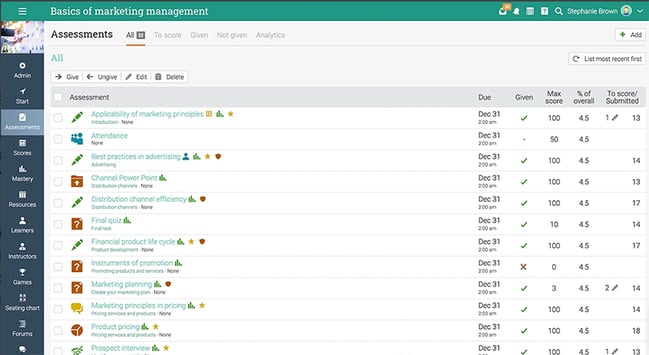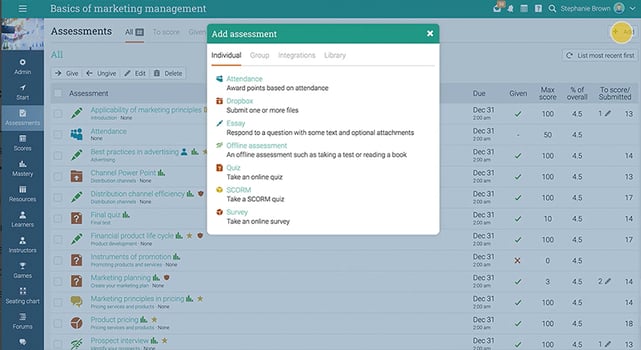In the first part of this series, we discussed a different, better, and more effective way to learn: competency-based learning.
This next post is about the assessment and demonstration of competency using a competency-based learning approach.
Traditional learning platforms weren’t build for modern learners
Traditional online learning systems are limited in their ability to accurately and reliably assess competency for one very simple reason: traditional online learning systems weren’t built for the modern learner. For assessment, these systems usually only support one one or two types of assessments with a heavy reliance on multiple-choice quizzes and other antiquated tests that fall short of accurately assessing mastery of a topic or a skill.
While these assessments can ascertain a learner’s basic understanding of the material, they don’t provide a comprehensive view of a learner's understanding or the ability to use this useful data in a meaningful way.
Additionally, simple assessment types in legacy environments can be easily gamed, allowing learners to memorize answers, guess correctly, or guess as many times as it takes to pass the test rather than really demonstrate understanding of the topic.
CYPHER legitimizes assessments and competency
 In addition to providing an engaging and personalized, modern learning experience supported by unique skills development features, site-wide automation, and flexible integrations, CYPHER takes a competency-based learning approach that ensures learners demonstrate mastery of a skill or concept before they move forward to the next lesson.
In addition to providing an engaging and personalized, modern learning experience supported by unique skills development features, site-wide automation, and flexible integrations, CYPHER takes a competency-based learning approach that ensures learners demonstrate mastery of a skill or concept before they move forward to the next lesson.
The CYPHER platform offers fifteen assessment types, including question banks, essays, gamification, self-evaluation, and more, ensuring that learners can demonstrate proficiency and competency. Use a combination of different assessment types to:
- Improve the accuracy and reliability of competency assessments. For example, assessments like essays, presentations, and case studies may provide a more comprehensive assessment of a student’s understanding and skills.
- Foster creativity and critical thinking among learners. For example, project-based assessments encourage learners to work together, think outside the box, and apply their knowledge in a real-world context, solve complex problems, and think creatively.
- Give instructors a better understanding of student engagement, progress, and performance to personalize recommendations and modify instruction as needed.
Benefits of competency-based learning with CYPHER
The benefits of competency-based learning with CYPHER include:
- Mastery-based progression: Learners advance to the next competency or learning level only after demonstrating mastery of the current competency. With clarity of level mastery for each competency, recommendations based on requirements to master remaining competencies, multiple assessments of each competency.
- Purpose-driven: Clearly defined learning objectives allow learners to understand the specific knowledge and skills they are expected to master with clearly defined competencies.
- Flexible pacing: Learners progress at their pace, spending more time on challenging concepts and moving quickly through concepts they grasp more easily. This enables learners to take ownership of their learning process and progress according to their needs and abilities.
- Personalized, real-world learning experiences: Competency-based learning supports personalized learning pathways, with instruction and support tailored to meet the unique needs of each learner, and encourages “aha” learning moments.
Assessment and competency: Frequent assessments, both formative and summative, measure students' progress toward mastering each competency. - Recognition of prior learning: CYPHER includes mechanisms for recognizing and crediting prior learning assessments whether from formal education, work experience, or other sources.
- Intuitive, personalized, and collaborative experience that modern learners expect: Features include site-wide automation, gamification, and integrations significantly improve the learning experience.
- Connected learning communities: learners have visibility into what’s happening around them, are easily able to communicate and collaborate with peers and instructors.
Try the competency-based learning approach on CYPHER
 We hope that you have a better understanding of competency-based learning and assessment, how CYPHER can help you implement this learning approach in your organization, and how you can eliminate the disappointment and frustration that often comes with conventional learning approaches.
We hope that you have a better understanding of competency-based learning and assessment, how CYPHER can help you implement this learning approach in your organization, and how you can eliminate the disappointment and frustration that often comes with conventional learning approaches.
CYPHER can help you to ensure employees learn the right things at the right time, that they learn them for the right reasons, and that they are able to demonstrate their real-world proficiency before they advance.
Ready to experience firsthand how CYPHER can help your organization with a competency-based learning approach to make learning, fun, meaningful, and effective? Schedule a free demo.





